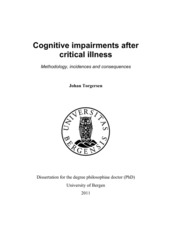| dc.contributor.author | Torgersen, Johan | en_US |
| dc.date.accessioned | 2011-12-07T15:43:23Z | |
| dc.date.available | 2011-12-07T15:43:23Z | |
| dc.date.issued | 2011-11-22 | eng |
| dc.identifier.uri | https://hdl.handle.net/1956/5268 | |
| dc.description.abstract | Brain dysfunction describes the wide range of alterations in brain function from persistent vegetative state to minor cognitive impairments. It has become evident that brain dysfunctions that arise during an intensive care unit (ICU) stay are associated with mortality, morbidity, post-ICU functional status and rehabilitation. Brain dysfunction in ICU patients is therefore of major interest both in clinical practice and research. Cognitive impairment is one of several types of brain dysfunctions that may become evident after critical illness. The aims of this thesis were to document the incidences of cognitive dysfunction after critical illness, to investigate the post-ICU development and effects of cognitive functions and, if possible, to point out etiological and predisposing factors for such impairment. To achieve this, we needed a neuropsychological approach to our patients. We chose to use the Cambridge Neuropsychological Test Automated Battery (CANTAB) as our method for evaluating cognitive function. CANTAB is a semi-automated neuropsychological test battery applied on a laptop PC. The program contains integrated normal reference population scores, which facilitate description of the tested patients’ level of cognitive function and the statistical handling of the results. CANTAB can be administered in an every day setting by non-specialised personnel. | en_US |
| dc.language.iso | eng | eng |
| dc.publisher | The University of Bergen | eng |
| dc.relation.haspart | Paper I: Torgersen J, Strand K, Bjelland TW, Klepstad P, Søreide E, Wentzel-Larsen T, Kvåle R, Flaatten H. Cognitive dysfunction and health related quality of life after cardiac arrest and therapeutic hypothermia. Acta Anaesthesiologica Scandinavia 2010; 54: 721–728. Full text not available in BORA due to publisher restrictions. The article is available at: <a href="http://dx.doi.org/10.1111/j.1399-6576.2010.02219.x" target="blank"> http://dx.doi.org/10.1111/j.1399-6576.2010.02219.x</a> | en_US |
| dc.relation.haspart | Paper II: Torgersen J, Helland CA, Flaatten H, Wester K. Reversible dyscognition in patients with unilateral, middle fossa arachnoid cyst revealed by a laptop based neuropsychological test battery (CANTAB). Journal of Neurology 2010; 257: 1909-1916. Full text not available in BORA due to publisher restrictions. The article is available at: <a href="http://dx.doi.org/10.1007/s00415-010-5634-0" target="blank"> http://dx.doi.org/10.1007/s00415-010-5634-0</a> | en_US |
| dc.relation.haspart | Paper III: Torgersen J, Engelsen B, Flaatten H, Gramstad A. Clinical validation of Cambridge Neuropsychological Test Automated Battery in a Norwegian epilepsy Population. Full text not available in BORA. | en_US |
| dc.relation.haspart | Paper IV: Torgersen J, Hole JF, Kvåle R, Wentzel-Larsen T, Flaatten H. Cognitive impairments after critical illness. Acta Anaesthesiologica Scandinavia 2011; 55: 1044–1051. Full text not available in BORA due to publisher restrictions. The article is available at: <a href="http://dx.doi.org/10.1111/j.1399-6576.2011.02500.x" target="blank"> http://dx.doi.org/10.1111/j.1399-6576.2011.02500.x</a> | en_US |
| dc.title | Cognitive impairments after critical illness. Methodology, incidences and consequences | en_US |
| dc.type | Doctoral thesis | |
| dc.rights.holder | Copyright the author. All rights reserved | |
| dc.subject.nsi | VDP::Medical disciplines: 700::Clinical medical disciplines: 750::Neurology: 752 | eng |
